Comprehensive preparatory training and instruction are vital for the success and safety of Antarctic field campaigns and operations. It is mandatory that everyone working in the Antarctic, whether on land or on polar ships, satisfy BAS requirements on medical fitness and training.
Job Specific Training Courses
Anytime from your contract start date, and likely before and also after you have completed Cambridge based Pre-Deployment Training you will be required to attend job specific training courses that will be dictated by your line manager according to your experience. The HR L&D Team will be your point of contact for these courses.
The Job Specific courses that you will be attending are tailored to the working environment in the Antarctic. As such we choose our course providers carefully and you could be required to attend courses located all over the country in order to complete your Individual Training Plan.
Pre-Deployment Training Courses
In addition to job specific training courses people who are going South for more than one month, with no previous or recent Antarctic fieldwork experience (or who have Antarctic working experience with other operators), will be required to attend an Antarctic Pre-Deployment Training Course. Those whose projects are entirely ship-based will receive a ‘briefing pack’ and are not required to attend an Antarctic Pre-Deployment Training course.
There are different elements to the Antarctic Pre-Deployment Training Courses, and different attendance requirements for delegates, according to their circumstances. BAS issues invitations to all named participants, 4–6 weeks before the events are scheduled to commence. Your invite will specify which training course we would like you to attend.
For dates and more information, please refer to the following pages:
Preparing to go south
A guide to going south with British Antarctic Survey provides an essential guide to going south with BAS.
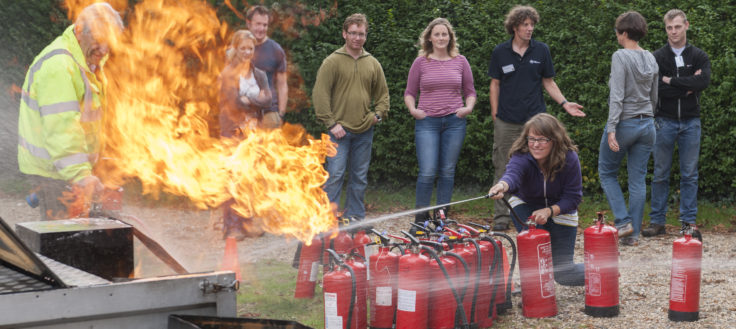
Aims of the Training Course
The aims of training course are to provide those going to the Antarctic with both practical advice and information regarding their trip, and more general background on the British Antarctic Survey and its work. Training provides a wide-ranging induction to BAS policies and culture, as well as an ideal opportunity for new recruits to meet with others with whom they will be living and working.

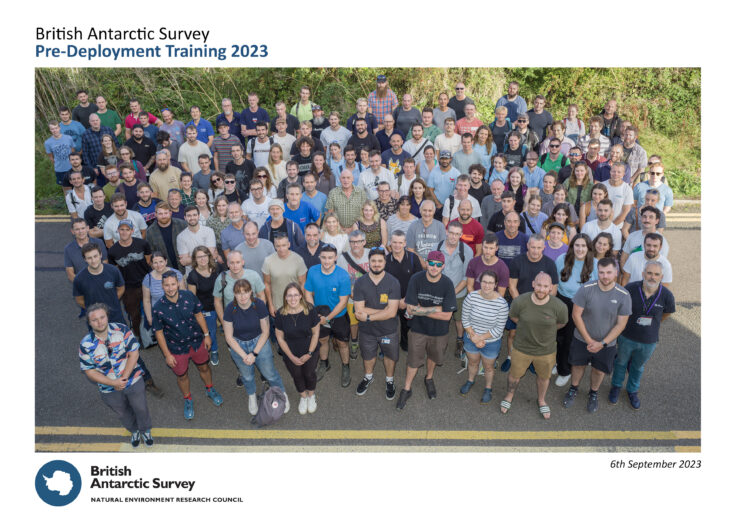
First Aid training
First Aid training is compulsory for people visiting BAS stations, working in the Deep Field and for a proportion of those engaged on research cruises*. Deployments of less than two weeks may be exempt from First Aid Training but will be reviewed on a case-by-case basis by BAS.
First Aid training will be provided for BAS staff, members of the Antarctic Employment Pool (AEP) and those going into the Deep Field, in the week following Pre-Deployment Training. The BAS Medical Unit (BASMU) deliver this training, which has been designed to meet the needs of BAS with particular reference to medical resources in the Antarctic. There will be a 3 day BASMU First Aid course and two 1 day BASMU First Aid courses. Training is delivered in a 3-year cycle as follows:
Year 1 – 3 day BASMU First Aid
Year 2 – 1 day BASMU First Aid
Year 3 – 1 day BASMU First Aid
Year 4 – 3 day BASMU First Aid
First Aid Training is required every season and any BAS staff (including AEP) who have not completed the 3 day BASMU First Aid training course within the last 3 years will be required to complete it at the next Pre-Deployment Training.
External collaborators are responsible for booking and funding their own First Aid at Work course, unless deploying into the deep field or instructed by BAS to conduct full BASMU First Aid.
The following table provides a guide to BAS First Aid training requirements, although decisions on individual cases will be made by BAS.
| Ship (Cruise)
Based |
Rothera &
KEP Based |
BI, Halley, Signy
and Field Based |
|||
| BAS Staff | BASMU First Aid
(Year as appropriate) |
BASMU First Aid
(Year as appropriate) |
BASMU First Aid
(Year as appropriate) |
||
| Visitors &
Non-BAS staff |
First Aid at Work is
required |
First Aid at Work is
required |
BASMU First Aid
(Year as appropriate) |
||
| Visitors exempt from standard training (DVs/Media) | First Aid at Work is
recommended |
First Aid at Work is
recommended |
BASMU First Aid
(Year as appropriate) |
||
| Contractors | First Aid at Work is
required |
First Aid at Work is
required |
BASMU First Aid
(Year as appropriate) |
*For those deploying on SDA in support of Research Cruises/voyages, BAS will ask that the following ratio of personnel are first aid trained.
- Research Cruises with up to 10 personnel: A minimum of 2 personnel are required to be BASMU first aid trained. The remainder of the personnel are recommended to undertake first aid at work training.
- Research Cruises with up to 20 personnel: A minimum of 3 personnel are required to be BASMU first aid trained. The remainder of the personnel are recommended to undertake first aid at work training.
- Research Cruises with up to 30 personnel: A minimum of 4 personnel are required to be BASMU first aid trained. The remainder of the personnel are recommended to undertake first aid at work training.
- Additional numbers of first aid trained personnel may be required onboard where team members fieldwork includes regular deployments on small boats and/or work on sea ice; a decision will be made at the discretion of BAS Polar Operations Team.
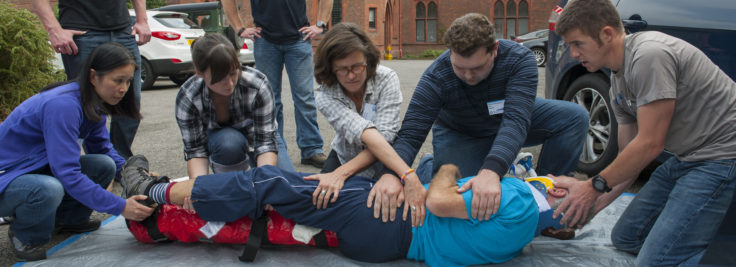
Winter Teams Training (WTT)
Those who will be wintering at BAS stations must also attend a Winter Teams Training Course. These courses provide instruction and practical training in Antarctic camp craft, along with glacier travel techniques and crevasse rescue under simulated conditions. These foundation course will be reinforced with further training in the Antarctic.
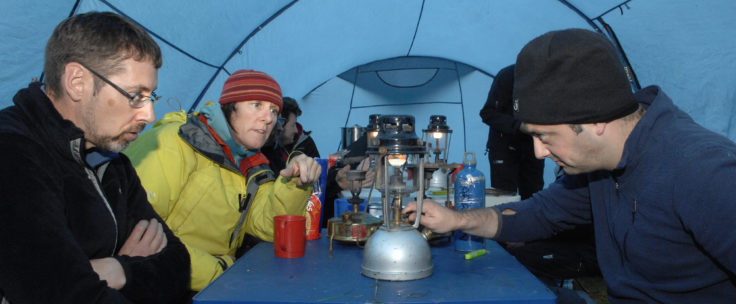
The courses also provide instruction and practical training in sub-Antarctic camp-craft, navigation and rescue techniques under simulated conditions.
Personal Survival Techniques Training
All BAS personnel and visitors engaged on a research cruise or who are transiting by ship to/from research stations will be required to hold a valid STCW 2010 (Standards of Training, Certification and Watch-keeping) Personal Survival Techniques (PST) certificate. This is the internationally agreed standard of personal survival training required for seafarers. All new Antarctic Employment Pool staff travelling on BAS vessels will be enrolled on a course.
External collaborators are responsible for booking and funding their own PST course.
Your PST certificate must now be NO MORE THAN 5 YEARS OLD for it to be valid. Refresher courses are not valid.
The training is available at most UK maritime colleges and courses must be arranged individually by the Principal Investigator. A list of available course centres can be obtained from Human Resources. Training fees will not be the responsibility of BAS and should be costed into a full proposal.
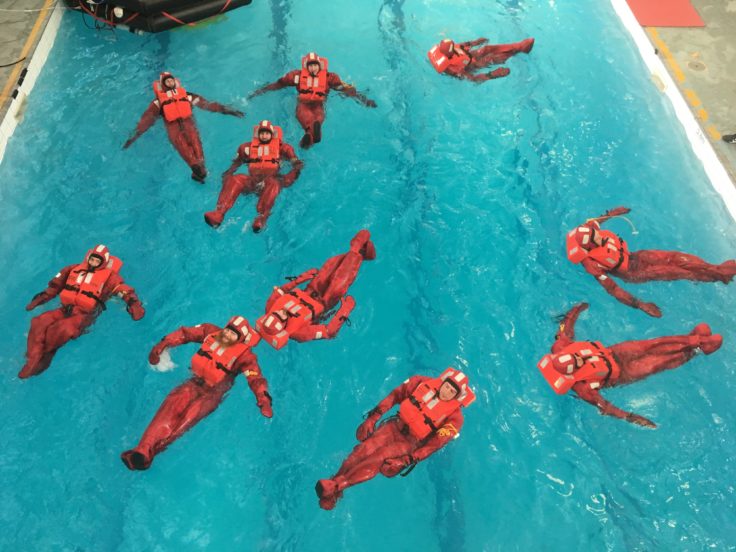
On joining the ship, personnel will be required to produce their certificate to the ship’s Master, who holds all marine certificates in case of an inspection. Without this certificate, personnel will not be permitted to join the ship.
Continuing training and drills are part of the ethos of the STCW 95 provisions. All personnel will be expected to comply with on-board briefings and drills.
More information on PST Training can be found here: pdf
Details of course providers can be viewed on the below link:
(Note BAS Antarctic Employment Pool (AEP) staff PST training (only) is arranged by Polar Operations Support Team, as part of induction.)